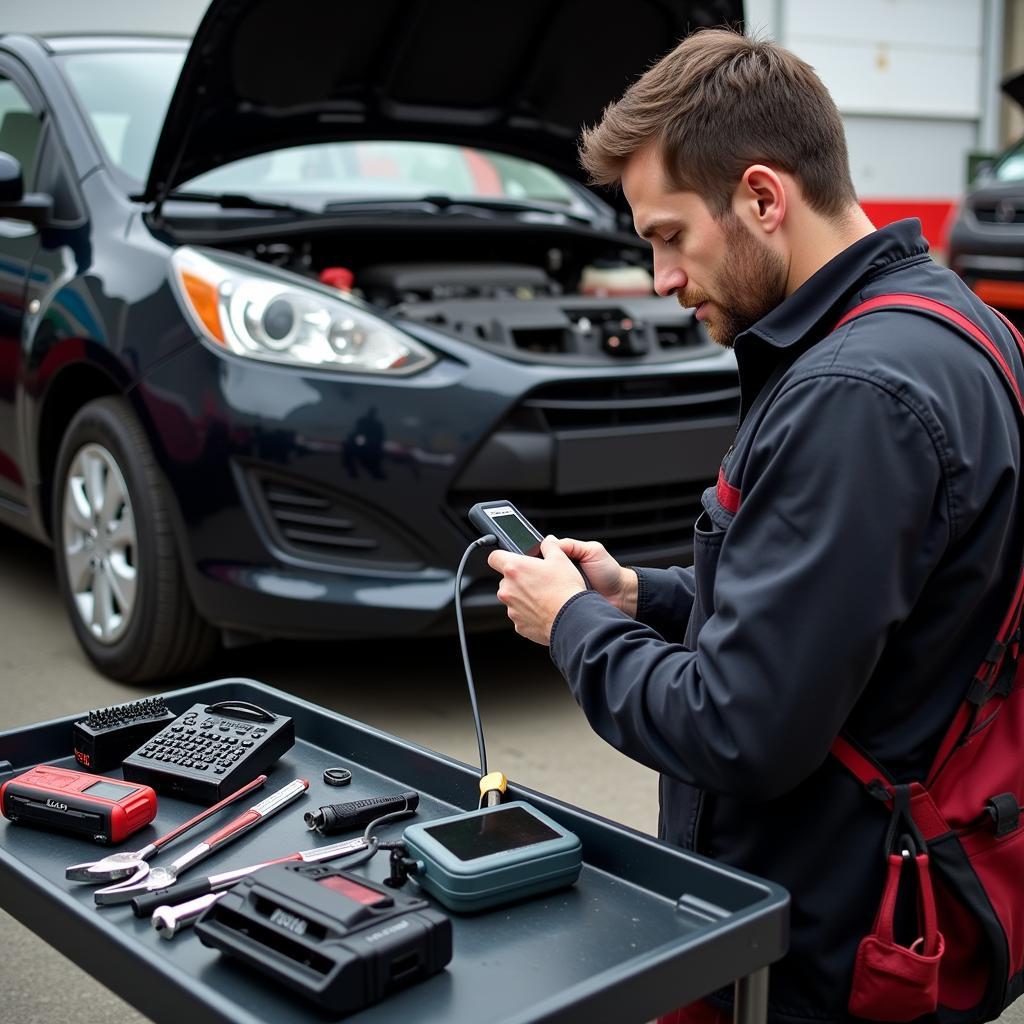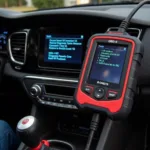Car repair diagnostic is a critical aspect of modern vehicle maintenance. Gone are the days of relying solely on a mechanic’s intuition. Today, sophisticated technology helps pinpoint the root cause of car troubles, leading to more efficient and accurate repairs. This article delves into the world of car repair diagnostic, equipping you with the knowledge to navigate the process confidently.
What is Car Repair Diagnostic?
Car repair diagnostic involves using advanced tools and techniques to identify the source of problems within your vehicle’s various systems. Think of it as a medical check-up for your car, where specialized equipment helps diagnose the issue before any “treatment” begins. This process replaces guesswork with data-driven insights, saving you time, money, and potential headaches in the long run.
Why is Car Diagnostic Important?
Accurate diagnosis is the cornerstone of effective car repair. Ignoring minor issues can snowball into major problems, leading to costly repairs and jeopardizing your safety on the road. Here’s why car diagnostic is indispensable:
- Accurate Problem Identification: Pinpoints the exact issue, eliminating unnecessary repairs and saving you money.
- Early Detection: Identifies minor problems before they escalate into major (and expensive) issues.
- Enhanced Safety: Ensures your vehicle is roadworthy and minimizes the risk of breakdowns or accidents.
- Improved Vehicle Performance: Addresses underlying issues that might be affecting fuel efficiency, engine performance, or overall drivability.
How Does Car Diagnostic Work?
Modern vehicles are equipped with onboard computer systems that monitor various components and functions. These systems generate Diagnostic Trouble Codes (DTCs) when they detect anomalies. During a car diagnostic, technicians use specialized tools, primarily OBD-II scanners, to retrieve these codes and interpret their meaning.
The process involves:
- Connecting the OBD-II Scanner: The scanner is plugged into your car’s OBD-II port, usually located under the dashboard on the driver’s side.
- Retrieving DTCs: The scanner communicates with your car’s computer, retrieving stored DTCs that indicate potential problem areas.
- Interpreting the Codes: Experienced technicians decipher the codes, which are often cryptic combinations of letters and numbers, to understand the nature of the issue.
- Further Investigation: Based on the DTCs and additional observations, technicians may conduct further tests using multimeters, pressure gauges, or other specialized tools to pinpoint the exact fault.
Common Car Problems Diagnosed
Car diagnostic can uncover a wide range of issues, from minor sensor malfunctions to complex engine problems. Some common problems that car diagnostic helps identify include:
- Engine Issues: Misfires, loss of power, unusual noises, check engine light illumination.
- Transmission Problems: Slipping gears, rough shifting, transmission fluid leaks.
- Brake System Faults: Spongy brakes, ABS warning lights, uneven braking.
- Electrical System Malfunctions: Battery issues, faulty wiring, sensor problems.
- Emissions Control System Errors: Oxygen sensor issues, catalytic converter problems.
What to Expect During a Car Diagnostic
When you take your car for a diagnostic check, expect a thorough assessment of its vital systems. The process typically involves:
- Visual Inspection: The technician will visually inspect your car for any obvious signs of damage or leaks.
- OBD-II Scan: They will connect an OBD-II scanner to retrieve diagnostic trouble codes.
- Component Testing: Depending on the initial findings, the technician may test specific components, such as sensors, actuators, or modules.
- Test Drive: In some cases, a test drive might be necessary to replicate the issue or observe the car’s behavior under specific conditions.
- Diagnosis and Repair Recommendations: Once the diagnostic is complete, the technician will provide you with a detailed report outlining the findings and recommended repairs.
Choosing a Car Diagnostic Service
Selecting a reputable and qualified car diagnostic service is crucial. Consider the following factors:
- Experience and Expertise: Look for technicians with experience in diagnosing and repairing your car’s make and model.
- Equipment and Technology: Ensure the service utilizes up-to-date diagnostic equipment and software.
- Reputation and Reviews: Check online reviews and ask for recommendations from trusted sources.
- Transparency and Communication: Choose a service that clearly explains the diagnostic process, findings, and repair options.
Car Diagnostic: Empowering Car Owners
Car repair diagnostic empowers car owners with knowledge and control over their vehicle’s maintenance. By understanding the process, its importance, and how to choose a reliable service, you can ensure your car receives the care it needs to stay in optimal condition for years to come.
FAQs
Q: How often should I get a car diagnostic?
A: It’s generally recommended to get a car diagnostic annually or whenever you experience unusual car behavior, warning lights, or performance issues.
Q: Can I perform car diagnostic myself?
A: While basic OBD-II scanners are available for personal use, interpreting codes and conducting further tests requires specialized knowledge and equipment best left to trained technicians.
Q: Is car diagnostic covered under warranty?
A: Warranty coverage for car diagnostic varies depending on the manufacturer and warranty terms. Consult your warranty documentation or contact the dealership for specific details.
Looking for the right tools for the job?
Check out some of the products and resources available on DiagFixPro that can help with your car repair diagnostic needs:
- car repair diagnostic codes: Learn more about interpreting those cryptic diagnostic trouble codes.
- car repair diagnostic forms: Streamline your diagnostic process with these helpful forms.
- laptop based car diagnostics uk: Discover powerful laptop-based diagnostic solutions for UK car owners.
Need more help with car repair diagnostics?
Contact us via Whatsapp: +1(641)206-8880, or Email: [email protected]. Our dedicated team is available 24/7 to answer your questions and guide you through any challenges you might be facing.
For more information on car maintenance and repair, explore our comprehensive resources and expert advice available on DiagFixPro.com. Your trusted source for all things car diagnostics.

